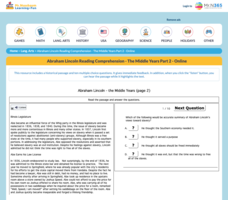Judicial Learning Center
The U.S. Supreme Court
How do Supreme Court justices determine which cases to consider? What happens when the Supreme Court decides not to take a case? The lesson explores important questions and others in the field of criminology. It focuses on the appeals...
Judicial Learning Center
Civil Rights and Equal Protection
Almost every American is familiar with the Supreme Court case of Brown vs. Board of Education. Far fewer understand the constitutional reasoning or the wide-ranging consequences of the ruling in the field of criminology. The interesting...
Judicial Learning Center
Your 1st Amendment Rights
Why should classes care about the First Amendment? An engaging lesson serves as a powerful tool for answering just that. As all four cases in the lesson relate directly to freedom of expression in schools, young scholars explore the...
Youth Outreach
Connecting the Separate Powers
Scholars demonstrate what they know about the separation of powers through role play. Two individuals act out a skit as the remaining class members discuss and decide whether the interaction they observed is an appropriate example of the...
Judicial Learning Center
Your 4th Amendment Rights
Americans love to learn about their rights, especially those that protect them from the government's power to invade their privacy. Young people are especially engaged by this topic. An informative lesson explores four Supreme Court...
Judicial Learning Center
Law and the Rule of Law
We hear a lot about the importance of the rule of law, but most people do not really know what those words mean. The lesson is a webpage that defines the rule of law, explains why it is important in a democratic society and provides...
C-SPAN
Choice Board: Expressed and Implied Powers
Article 1, Section 8 of the United States Constitution expressly lists powers given to Congress. Over the years, lawmakers have expanded the enumerated powers to include powers implied by the list. To better understand the significance...
Curated OER
Fair Judgment
Students consider the demands of the judicial process and work in small groups to write editorials in response to the one that is read in class. For homework, they grade a television judge and write reflective essays.
Curated OER
Selecting Judges: Playground Bullying - Judicial Fairness
Students discuss behavior. In this judging fairness lesson plan, students discover how there are different perceptions on what is the most fair way to solve a situation. They work in small groups and as a class to role play and discuss...
Curated OER
Searching for Answers
How does a judge in the federal judicial court decide on a verdict? Give your middle and high schoolers a better idea of how final decisions are made in the judicial system. Then split your class into four groups, assigning each group a...
Mr. Nussbaum
Abraham Lincoln Reading Comprehension—The Middle Years (Part 2)
Abraham Lincoln's face may only be worth one cent, but the online reading passage and questions about his life are an invaluable resource. Pupils read a passage about Lincoln's experience with the Illinois Legislature, earning his law...
Illustrative Mathematics
Listing Fractions in Increasing Size
Increase the depth of your class's fractional number sense with this number-ordering activity. Given four fractions, each with different numerators and denominators, young learners are asked to place them in order from smallest to...
Judicial Learning Center
How to Create a Law
Laws affect everything from a scholar's favorite public park to rules in the classroom. Express the importance of lawmaking and teach how they relate to every facet of life with a resource on how a bill becomes a law.
iCivics
Governing Communities
The government at the local level acts as perhaps one of the most relevant government systems to many in their communities. Learners discover how the local government shapes their lives and the similarities and differences between the...
iCivics
The Fourth Branch: You!
Take time to remind your young learners of the valuable understanding that each branch of the United States government is really composed of other citizens. The reading material and worksheets of this resource cover the importance of...
Carolina K-12
Principles of the US Constitution
After breaking into groups according to major principles of government (i.e., popular sovereignty, separation of powers, checks and balances, etc.) in the United States, your class members will produce public service announcements...
Curated OER
The Three Branches of Government
Students write about working in one branch of government. In this branches of government lesson, students read about the three levels of government using various websites and then work in groups to discuss, illustrate and write about...
Curated OER
3 Branches of Government
Fifth graders explain the process of making and passing laws within Congress by simulating this as a class. They review the three branches of government and focus on the legislative branch for the purposes of creating a bill.
Curated OER
Three Branches of Government
Fourth graders listen to a lecture about the government of Indiana, and the three branches of government. They discuss the reasons for the three branches and read from their text the information on government. Students play a game to...
Curated OER
Separation of Powers Between the Three Branches of
Students investigate the concept of the three branches of government by dividing into three teams. They record the powers of the three branches.
Curated OER
Bill of Rights
US history classes explore constitutional rights as they relate to court cases involving teens. Your class must already be familiar with the Bill of Rights before beginning this series of exercises. In preparation for a debate-style...
Administrative Office of the US Courts
US v. Alvarez
Is it illegal to lie about military service? Discuss the ways the First Amendment affects the Stolen Valor Act with a lesson that focuses on the Supreme Court case U.S. v. Alvarez. As high schoolers learn more about the history of the...
Curated OER
How Long is Too Long?
Students examine the legal term statute of limitations and how it varies based on the type of criminal or civil activity under discussion. They discern the applicable statute of limitations given an hypothetical or actual situation and...
Curated OER
US Government: Supreme Court
Students explore the powers of the Supreme Court. In this Judicial Branch lesson, students define vocabulary regarding the branch's responsibilities, take notes on a video regarding the branch, and discuss the powers of the branch in a...

























